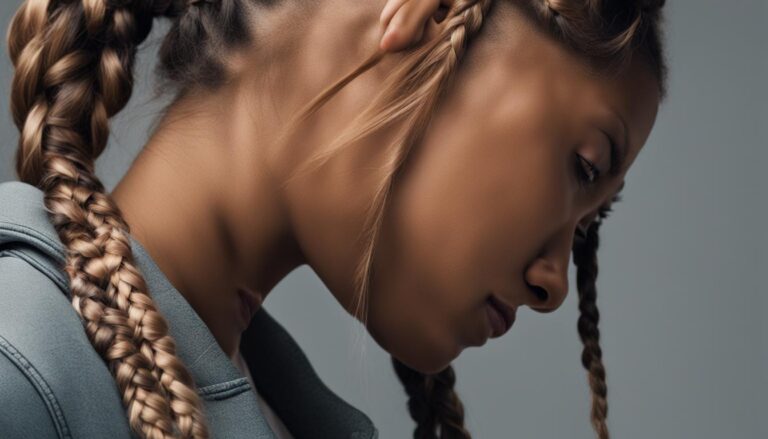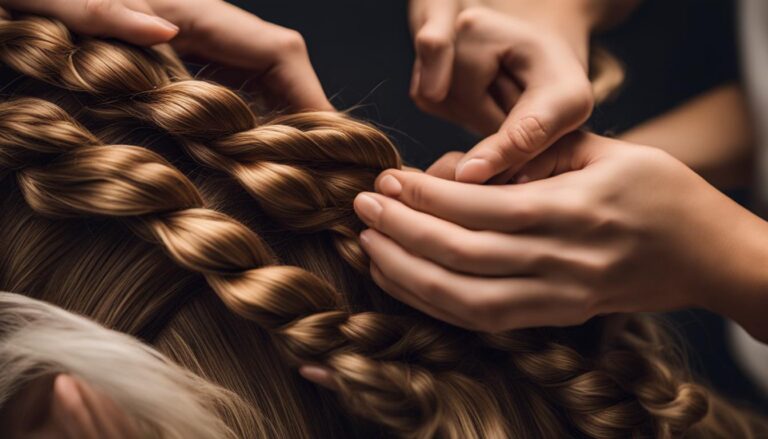Why is black hair hard to manage?
Managing black hair can be a challenging task, often requiring specific care and attention. The unique texture and characteristics of black hair present their own set of difficulties, which can be further compounded by societal expectations and systemic racism. In this article, we will explore the challenges faced in managing black hair, as well as provide valuable tips and insights for effective black hair care.
Black hair care involves understanding the complexities of natural hair, embracing its beauty, and adopting tailored hair care routines. By addressing these challenges head-on and celebrating the diversity of hair types, we can create a more inclusive and accepting society.
Key Takeaways:
- Managing black hair can be challenging due to its unique texture and characteristics.
- Societal expectations and systemic racism contribute to the perceived difficulty in managing black hair.
- Education, self-acceptance, and embracing natural beauty are key to effectively managing black hair.
- A healthy hair care routine and the use of quality products are essential for maintaining black hair.
- Celebrating the diversity of hair types and challenging beauty standards is crucial for inclusivity.
The impact of social circumstances on black hair care
Managing black hair can be influenced by various social circumstances that shape our perceptions and expectations. These factors contribute to the challenges faced in caring for and maintaining black hair. Understanding the impact of these social circumstances is crucial in developing effective strategies for dealing with these challenges.
One significant social circumstance that affects black hair care is the expectations placed on black individuals. Society often upholds mainstream beauty standards that prioritize straight hair, leaving those with natural curls feeling pressured to conform. This can lead to a constant struggle to achieve specific curl patterns and textures, causing frustration and dissatisfaction.
“The pressure to conform to Eurocentric beauty standards can create a sense of inadequacy and difficulty in managing black hair.”
Furthermore, the information and products available for black hair care can be overwhelmingly conflicting. This is often influenced by capitalism and marketing strategies, leading to a wide range of products that claim to cater to black hair but may not necessarily meet its specific needs. Finding the right products and care routines becomes a daunting task, adding to the perceived difficulty of managing black hair.
The challenges of transitioning from chemically straightened hair to natural curls
A specific challenge that black individuals may face is transitioning from chemically straightened hair to natural curls. This process can be emotionally and mentally taxing. It requires not only adjusting to a new physical appearance but also navigating the societal expectations and norms surrounding black hair. The journey of embracing natural hair can be met with resistance and criticism from others, making the transition even more challenging.
During this transition, individuals may also experience uncertainty about how to care for their newly natural hair. The lack of knowledge and experience in managing natural curls can lead to confusion and frustration. It takes time and experimentation to find the right products, techniques, and styles that work best for each unique hair type.
In conclusion, the impact of social circumstances on black hair care cannot be underestimated. The societal expectations and conflicting information surrounding black hair contribute to the perceived difficulty in managing it. Understanding these influences is essential in developing effective strategies for caring for black hair and embracing its natural beauty.
The role of racism in black hair care
Racism plays a significant role in the challenges faced in managing black hair. Black individuals often experience discrimination and prejudice in various aspects of life, including the workplace, schools, and healthcare. This systemic racism creates a hostile environment where black hair is not seen as acceptable or professional.
One manifestation of this discrimination is the societal pressure to conform to Eurocentric beauty standards. The dominant culture values straight and sleek hair, leading many black individuals to alter the natural texture of their hair through chemical treatments or heat styling. This pressure to conform can make it difficult for black individuals to embrace their natural hair and can lead to damage and hair loss.
Furthermore, the lack of representation and understanding of black hair in mainstream beauty and hair care industries exacerbates the challenges faced by black individuals. Many hair care products and salons are not designed to cater to the specific needs of black hair, leaving individuals without access to suitable options. This lack of representation perpetuates the notion that black hair is difficult to manage and reinforces societal expectations that black individuals should conform to Eurocentric standards of beauty.
The impact of racism on black hair care extends beyond individual experiences. It is a systemic issue that requires a collective effort to challenge and overcome. By promoting inclusivity, representation, and education, we can work towards creating an environment where black individuals feel empowered to embrace and care for their natural hair, free from discrimination and societal expectations.
Overcoming the Challenges of Black Hair Care
Managing black hair can indeed come with its challenges, but there are effective tips and techniques that can help you overcome them and embrace the beauty of your natural hair. By following these black hair care tips, you can achieve healthier, more manageable hair while celebrating your unique beauty.
Understanding Your Hair Type
One of the first steps in managing black hair is understanding your specific hair type. Black hair comes in various textures, from tightly coiled to wavy, and each type requires different care. Take the time to identify your hair type and research the best techniques and products for your specific needs.
“Understanding the unique characteristics of your hair is crucial in developing an effective hair care routine.”
Creating a Healthy Hair Care Routine
Developing a consistent and healthy hair care routine is essential for managing black hair. This routine should include regular washing, conditioning, and moisturizing to keep your hair hydrated and nourished. Incorporating deep conditioning treatments and protective styling can also help prevent breakage and promote hair growth.
- Wash your hair regularly with a gentle, sulfate-free shampoo to remove dirt and product buildup.
- Follow up with a moisturizing conditioner to restore moisture and soften your hair.
- Apply a leave-in conditioner to provide additional hydration and protect your hair from damage.
- Use a wide-toothed comb or your fingers to detangle your hair gently, starting from the ends and working your way up.
- Style your hair in protective hairstyles, such as braids or twists, to minimize manipulation and reduce the risk of breakage.
Remember, consistency is key when it comes to maintaining healthy black hair.
Using Quality Hair Products
Investing in high-quality hair products specifically formulated for black hair can make a significant difference in managing your hair. Look for products that are moisturizing, free from harsh chemicals, and designed to enhance the natural beauty of black hair. This includes shampoos, conditioners, leave-in treatments, and oils that cater to your hair type and promote overall hair health.

By following these black hair care tips, you can embrace the uniqueness of your natural hair and achieve healthy, manageable locks. Remember that caring for black hair is a journey of self-discovery and self-acceptance, so enjoy the process and celebrate your beautiful, natural hair.
Simplifying the Hair Care Routine
Managing black hair can be made more manageable by simplifying the hair care routine. By breaking down the routine into smaller, more manageable tasks, it becomes easier to maintain healthy and beautiful hair. One effective approach is to wash and condition the hair less frequently. Over-washing can strip the hair of its natural oils, leading to dryness and breakage. By washing every few days or as needed, the hair can retain more moisture and maintain its natural health.
Using natural oils in the hair care routine can also help simplify and optimize the process. Natural oils, such as coconut oil, jojoba oil, or argan oil, can provide the hair with essential nutrients, moisture, and protection. Applying a small amount of oil to the ends of the hair or throughout the strands can help seal in moisture and reduce frizz.
Another effective practice for managing black hair is to adopt protective styles. Protective styles, such as braids, twists, or buns, help to minimize manipulation and reduce damage to the hair. These styles can also help to retain moisture and promote hair growth. When choosing protective styles, it’s important to use gentle techniques and avoid excessive tension that can lead to breakage or hair loss.
Optimal Hair Care Practices
- Wash and condition the hair less frequently to retain moisture and natural oils
- Use natural oils, such as coconut oil or jojoba oil, to provide essential nutrients and moisture to the hair
- Adopt protective styles to minimize manipulation and reduce damage
- Avoid excessive heat styling and use heat protectant products when necessary
- Invest in high-quality hair care products that are free from harmful ingredients
- Follow a healthy diet and lifestyle to promote overall hair health
“Simplifying the hair care routine can make managing black hair more manageable. By focusing on essential tasks, using natural oils, and adopting protective styles, it’s possible to maintain healthy and beautiful hair.” – Hair Care Expert
Embracing natural Afro hair
When it comes to caring for Afro hair, embracing its natural form is key. Rather than attempting to conform to societal beauty standards, it’s important to work with the unique texture of Afro hair and prioritize its health and well-being. By doing so, managing natural Afro hair can become a more manageable and enjoyable process.
One of the first steps in embracing natural Afro hair is understanding its specific needs. Afro hair tends to be more prone to dryness and requires regular moisturizing to maintain its health. Using moisturizing products that are specifically formulated for Afro hair, such as leave-in conditioners or hair oils, can help keep the hair hydrated and prevent breakage.
Protective styling is another important aspect of maintaining natural Afro hair. Styles like braids, twists, or bantu knots can help protect the hair from damage caused by manipulation and environmental factors. Additionally, incorporating low-manipulation hairstyles, such as wearing the hair in a loose afro or opting for a wash-and-go style, can reduce the risk of breakage and promote healthy hair growth.
Embracing natural beauty and self-acceptance are essential in the journey of managing Afro hair. Rather than viewing Afro hair as difficult or hard to manage, it’s important to celebrate its uniqueness and beauty. By adopting a positive mindset and embracing the natural state of Afro hair, individuals can develop a healthier relationship with their hair and feel empowered to explore various styles and care routines that best suit their personal preferences.

Key Takeaways:
- Embrace the natural form of Afro hair and work with its unique texture.
- Understand the specific needs of Afro hair and prioritize moisture.
- Utilize protective styling to minimize damage and promote healthy hair growth.
- Celebrate natural beauty and cultivate self-acceptance in managing Afro hair.
The importance of self-acceptance and embracing all hair types
Self-acceptance is a powerful tool when it comes to managing black hair and embracing its unique beauty. By challenging the beauty standards that have long favored certain hair textures, we open ourselves up to a world of diversity and celebration. Embracing all hair types, including natural Afro hair, allows us to break free from the constraints of societal norms and truly appreciate the beauty that lies within each individual.
Through self-acceptance, we can foster a sense of inclusivity and representation in our communities. By embracing the diversity of hair types, we send a powerful message that all individuals, regardless of their hair texture, are valued and worthy of love and care. This shift in mindset not only benefits those with black hair but also contributes to a more inclusive and accepting society for everyone.
Embracing diversity in hair types:
- Recognize and challenge societal beauty standards that prioritize certain hair textures.
- Appreciate the unique beauty of each individual’s hair, regardless of its texture or appearance.
- Promote representation and inclusivity by celebrating all hair types in media, fashion, and everyday life.
“When we embrace the diversity of hair types, we create a space where everyone feels seen, valued, and beautiful.” – Anonymous
Challenging beauty standards is not always easy, but it is an important step towards creating a more inclusive and accepting world. By embracing all hair types, we empower individuals to be their authentic selves and inspire others to do the same. Let us celebrate the beauty of black hair and all its variations, and in doing so, foster a society that values diversity and self-acceptance.

Conclusion
Managing black hair requires navigating through societal pressures, conflicting information, and systemic racism. However, by equipping ourselves with knowledge, adopting healthy hair care routines, and embracing our natural beauty, we can effectively manage diverse hair types.
It is crucial to celebrate and uplift natural hair, including the beauty of Afro hair. By challenging narrow beauty standards and promoting inclusivity, we create space for all hair types to be accepted and celebrated.
Remember, there is no one-size-fits-all approach to black hair care. Each individual’s hair is unique, and our routines should be tailored to meet its specific needs. By prioritizing self-acceptance, embracing diversity, and challenging societal norms, we can cultivate a culture that celebrates and supports all hair types.
So let’s celebrate the beauty of natural hair, manage it with care, and continue to promote inclusivity and representation in the beauty industry. Together, we can create a world where all hair types are valued, cherished, and celebrated.
FAQ
Why is black hair often perceived as difficult to manage?
Black hair is often perceived as difficult to manage due to a combination of social circumstances, conflicting information, and systemic racism.
What are the challenges of transitioning from chemically straightened hair to natural curls?
Transitioning from chemically straightened hair to natural curls can be emotionally and mentally challenging, as it involves embracing a new hair texture and facing societal expectations.
How does social circumstances impact black hair care?
The social circumstances surrounding black hair contribute to the perceived difficulty in managing it. Black individuals often face pressure to conform to mainstream beauty standards, which prioritize straight hair.
How does racism play a role in black hair care?
Racism plays a significant role in the challenges faced in managing black hair. Black individuals often experience discrimination and prejudice, which can create pressure to alter the natural texture of their hair to conform to Eurocentric beauty standards.
How can the challenges of black hair care be overcome?
Educating oneself about proper hair care practices, identifying the specific needs of one’s hair type, and using good quality products can help in maintaining healthy and manageable black hair.
What are some tips for simplifying the hair care routine for black hair?
Breaking down the hair care routine into smaller tasks, using natural oils to maintain moisture, and adopting protective styles can make managing black hair more manageable.
How can natural Afro hair be effectively managed?
Embracing the natural form of Afro hair, working with its unique texture, and prioritizing its health and well-being can make the management process more manageable.
Why is self-acceptance and embracing all hair types important?
Promoting self-acceptance and embracing the diversity of hair types is crucial for fostering inclusivity and representation. Challenging beauty standards that prioritize certain textures is essential.







